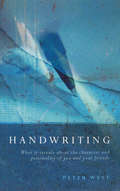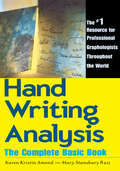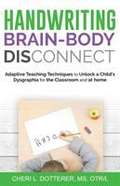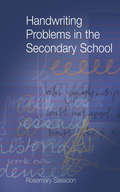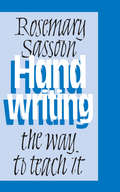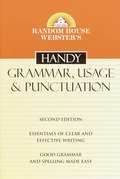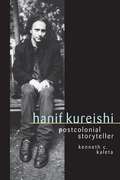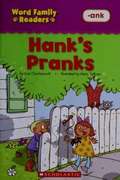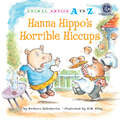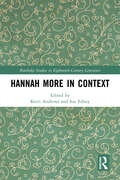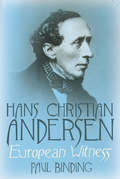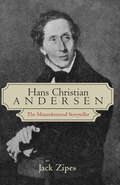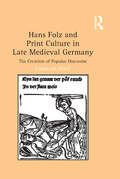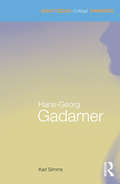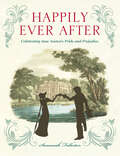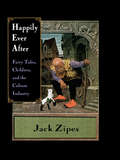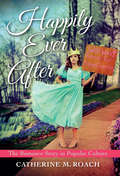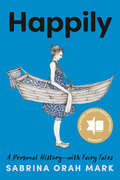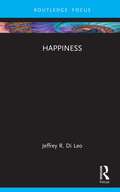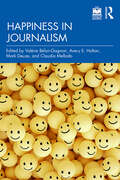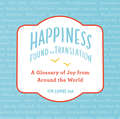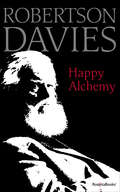- Table View
- List View
Handwriting
by Peter WestDo you realize how revealing your handwriting is? Whenever you put pen to paper - whether applying for a job, addressing an envelope or merely doodling - you may be giving away much more about yourself than you intend.In this highly readable and authoritative guide, graphologist Peter West uses over 300 illustrations to analyse:-General features - slant, size and margin-Specifics - capitals, numbers, signatures and choice of ink and paper colour-Doodles - what is the secret of your absent-minded designs?-The letters of the alphabet - identifying the main stylistic variationsIt includes illuminating sections on graphology as an aid to:-Assessing compatibility in relationships-Personal management-Child guidanceHandwriting provides a fascinating and invaluable chance to better understanding yourself and others.
Handwriting Analysis: The Complete Basic Book
by Karen Kristin Amend Mary Stanbury RuizLearn the many ways handwriting can reveal personality traits in this comprehensive introduction to graphology. In Handwriting Analysis, graphology expert Karen Kristin Amend offers a fresh approach to the principles of graphology. Covering all aspects of handwriting, from size and spacing to pace and form quality, this book is designed to help readers learn the skills of whole-person profiling. Amend demonstrates how to determine various personality traits ranging from mood to moral character, self-confidence, and emotional needs. She also shows how to detect emotional disturbance or mental illness. With new material for understanding the significance of the writing rhythm, this volume also provides handwriting samples of famous people.
Handwriting Brain-Body Disconnect: Adaptive teaching techniques to unlock a child's dysgraphia for the classroom and at home
by Cheri L DottererThere is a misconception about dyslexia, dysgraphia, and dyscalculia. Some people use the terms interchangeably. Simply put: dyslexia is defined as difficulty with reading; dysgraphia is defined as difficulty with writing; and dyscalculia is defined as difficulty with math concepts. Each topic is much more complicated. This book is written for teachers, parents, occupational therapists transitioning to school-based practice, and other related service professionals, focusing on dysgraphia.
Handwriting Problems in the Secondary School
by Rosemary Sassoon'The book fulfils its purpose admirably...[It] should be required reading for all Primary and Secondary headteachers - they lead the policy making in schools' - Journal of the Writing Equipment Society `This excellent new text from the handwriting specialist Rosemary Sassoon will be of great interest to secondary school SENCOs and a range of other staff supporting children who are experiencing difficulties with handwriting' - SENCO Update A considerable proportion of pupils leave primary school unable to write well enough to deal with the demands of secondary school. This innovative new book aims to help teachers and SENCOs to work alongside pupils to help them address their own difficulties. The book has three parts: Part one explores the various issues which underpin any discussion of handwriting: letterforms; the pros and cons of handwriting models; how to help children write at speed; writing posture; pens and pen hold; left-handedness; talking to parents; and some of the common causes of handwriting problems. Part two presents a series of examples of handwriting in photocopiable form, aimed principally at the pupils but with full teacher support, designed to show pupils a range of handwriting problems, helping them them to self-diagnose and work towards improvement. Each page offers practical tips and help for pupils with difficulties. All of the photocopiable material is also provided in electronic format on the companion website. Part three sets out a diagnostic technique for teachers to follow, outlining three approaches to tackling handwriting problems: a quick, small-group assessment; providing one-to-one help; and working with a whole class. Each approach is outlined in detail, offering advice on effective observation, procedures to follow in giving appropriate practical help to pupils, and how to assess progress. Part three also offers guidelines for designing checklists, and the role of surveys and research. Authoritative, wide-ranging and full of practical help, this book will be particularly useful for secondary teachers, secondary SENCOs and teaching support staff. Rosemary Sassoon is an independent consultant and lecturer, based in Sevenoaks, Kent. She is the author of Handwriting: The Way to Teach it, Paul Chapman Publishing, 2003.
Handwriting: The Way to Teach It (One-off Ser.)
by Rosemary Sassoon`I found this a fascinating book to read, I could identify with my time at school when I would often write with my paper almost in at right angles to my body because I found this comfortable, and the teacher's insistence that the paper be "straight" in front of me. This then made me twist my body into a ridiculous shape, and would sometimes result in punishment for not "sitting on the chair correctly"....if only the teacher had understood the same principles as Rosemary Sassoon, who in this book emphasizes "flexibility and clear thinking about essential issues, rather than to impose solutions' - Spare-Chair `Handwriting: The Way to Teach It should be required reading wherever Primary school teachers are trained, then perhaps there would be fewer young people still struggling to communicate in legible writing in Secondary school and later life' - Handwriting Today `This is a comprehensive textbook, and an extremely accessible and practical guide which should be on the bookshelf of every practitioner. I recommend it highly' - Jeni Riley, Head of Early Childhood and Primary Education, Institute of Education, University of London This book is an essential classroom guide to the teaching of handwriting. It covers all aspects of the subject: from whole-school planning, to classroom management and the teaching of letters in a highly illustrated and practical sequence; and from initial letter forms through to joined writing. The author presents many examples and imaginative ideas to make learning to write more effective and interesting for children and for teachers. This Second Edition includes material on problems which children can have with handwriting, and how to diagnose and remedy them. The author offers strategies for better teaching, and her aim throughout the book is to encourage flexibility and clear thinking about essential issues, rather than to impose solutions.
Handy Grammar Usage and Punctuation
by Random HouseA clear, precise guide to correct English Includes sections on spelling rules and common grammatical errors Small-format paperback at a great low price
Hanif Kureishi: Postcolonial Storyteller
by Kenneth C. Kaleta"Hanif Kureishi is a proper Englishman. Almost." So observes biographer Kenneth Kaleta. Well known for his films My Beautiful Laundrette and Sammy and Rosie Get Laid, the Anglo-Asian screenwriter, essayist, and novelist has become one of the leading portrayers of Britain's multicultural society. His work raises important questions of personal and national identity as it probes the experience of growing up in one culture with roots in another, very different one. <P><P>This book is the first critical biography of Hanif Kureishi. Kenneth Kaleta interviewed Kureishi over several years and enjoyed unlimited access to all of his working papers, journals, and personal files. From this rich cache of material, he opens a fascinating window onto Kureishi's creative process, tracing such works as My Beautiful Laundrette, Sammy and Rosie Get Laid, The Buddha of Suburbia, London Kills Me, The Black Album, and Love in a Blue Time from their genesis to their public reception. Writing for Kureishi fans as well as film and cultural studies scholars, Kaleta pieces together a vivid mosaic of the postcolonial, hybrid British culture that has nourished Kureishi and his work.
Hank's Pranks (Word Family Readers)
by Liza Charlesworth"Hank Ank is always playing a prank on someone. But how will Hank feel when a prank is played on him? Find out in this silly tale that teaches lots and lots of -ank words."--
Hanna Hippo's Horrible Hiccups (Animal Antics A to Z)
by Barbara deRubertisHanna Hippo is hungry. She hopes to have one of Homer Hog's huckleberry muffins, but her plan has one hitch—a horrible case of hiccups!
Hannah More in Context (Routledge Studies in Eighteenth-Century Literature)
by Kerri AndrewsThis book relocates the long life and literary career of the poet, playwright, novelist, philanthropist and teacher Hannah More (1745-1833) in the wider social and cultural contexts that shaped her, and which she helped shape in turn. One of the most influential writers and campaigners of the late eighteenth and early nineteenth centuries, More’s reputation has suffered unfairly from accusations of paternalism and provincialism, and misunderstandings of her sincerely-held but now increasingly unfamiliar evangelical beliefs. Now, in this book, readers can explore a range of essays rooted in up-to-the-minute research which examines newly-recovered archival materials and other evidence in order to present the fullest picture yet of this complex and compelling author, and the era she helped mould with her words.
Hannah Whitman Heyde: The Complete Correspondence
by Hannah Whitman ["1823-1908"]The correspondence of Hannah Whitman Heyde (1823-1908), younger sister of poet Walt Whitman, provides a rare glimpse into the life of a nineteenth-century woman. Married to well-known Vermont landscape artist Charles Louis Heyde (1820-1892), Hannah documented in letters to her mother, Louisa Van Velsor Whitman (1795-1873), and other family members, her lived experience of ongoing physical and emotional abuse at the hands of her husband. Hannah has long been characterized in biographical and scholarly studies of Whitman’s family as a neurotic and a hypochondriac—a narrative promulgated by Heyde himself—but Walt Whitman carefully preserved his sister’s letters, telling his literary biographer that his intention was to document her plight. Hannah’s complete letters, gathered here for the first time and painstakingly edited and annotated by Maire Mullins, provide an important counternarrative, allowing readers insight into the life of a real nineteenth-century woman, sister, and wife to famous men, who endured and eventually survived domestic violence.
Hans Christian Andersen
by Paul BindingRarely does an American or European child grow up without an introduction to Hans Christian Andersen's "The Ugly Duckling," "The Princess and the Pea," or "Thumbelina." Andersen began publishing his fairy tales in 1835, and they brought him almost immediate acclaim among Danish and German readers, followed quickly by the French, Swedes, Swiss, Norwegians, British, and Americans. Ultimately he wrote more than 150 tales. And yet, Paul Binding contends in this incisive book, Andersen cannot be confined to the category of writings for children. His work stands at the very heart of mainstream European literature. The author considers the entire scope of Andersen's prose, from his juvenilia to his very last story. He shows that Andersen's numerous novels, travelogues, autobiographies, and even his fairy tales (notably addressed not to children but to adults) earned a vast audience because they distilled the satisfactions, tensions, hopes, and fears of Europeans as their continent emerged from the Napoleonic Wars. The book sheds new light on Andersen as an intellectual, his rise to international stardom, and his connections with other eminent European writers. It also pays tribute to Andersen's enlightened values-values that ensure the continuing appeal of his works.
Hans Christian Andersen: The Misunderstood Storyteller
by Jack ZipesThe 2005 bicentenary of Hans Christian Andersen's birth is an opportunity to re-evaluate the achievement of one of the great figures of the fairy tale and storytelling tradition, a beloved writer famous for The Snow Queen and The Little Mermaid, The Ugly Duckling and The Red Shoes and many other now classic tales. Jack Zipes broadens our understanding of Andersen by exploring the relation of the Danish writer's work to the development of literature and of the fairy tale in particular. Based on thirty-five years of researching and writing on Andersen, this new book is a welcome reconsideration of Andersen's place and of his reception in English-speaking countries and on film.
Hans Folz and Print Culture in Late Medieval Germany: The Creation of Popular Discourse
by Caroline HueyIn this study, author Caroline Huey analyzes the copious literary output of medieval poet and barber-surgeon Hans Folz in all its variety-whether Meisterlied, Reimpaarspruch or carnival play. Heretofore, published research to do with Folz's multifaceted and compelling oeuvre has been fragmentary, because scholars have restricted themselves by genre in examining themes in Folz's work. By integrating the different themes across Folz's output, and by integrating consideration (previously neglected by earlier critics) of Folz's role as barber-surgeon, Huey offers new insights as to the interaction of these themes and to the character of the poet's work overall. She shows that ultimately Folz is concerned with the circulation of knowledge and power, correct and incorrect behavior, and, above all, with finding order. In each chapter, Huey examines a particular theme from Folz's life and/or work. She looks at how adeptly he commandeers the new technology of printing to further his own ends; how his ubiquitous physicality connects his medical body to his Christian body; his attitude toward women; and the anti-Jewish thread in his work.
Hans-Georg Gadamer (Routledge Critical Thinkers)
by Karl SimmsHans-Georg Gadamer’s theory of hermeneutics is one of the most important modern theories of interpretation and understanding, and at its heart is the experience of reading literature. In this clear and comprehensive guide to Gadamer’s thought, Karl Simms: presents an overview of Gadamer’s life and works, outlining his importance to hermeneutic theory and its place in literary studies explains and puts into context his key ideas, including ‘dialogue’, ‘phronēsis’, ‘play’, ‘tradition’, and ‘horizon’ shows how Gadamer’s ideas have been influential in the interpretation of literary texts explains Gadamer’s debates with key contemporaries and successors, such as Habermas, Ricoeur and Derrida provides detailed suggestions for further reading. With a significance that crosses disciplinary boundaries from cultural studies, literary theory and philosophy through to history, music and fine arts, Gadamer’s pioneering work on hermeneutic theory remains of crucial importance to the study of texts in the humanities.
Happily Ever After: Celebrating Jane Austen's Pride and Prejudice
by Susannah Fullerton“An intelligent and generous companion to Pride and Prejudice: its author and her era, characters, language, reception, [and] adaptations.” —Sydney Morning HeraldPride and Prejudice has a fair claim to being the world’s favorite novel. Read and studied from Cheltenham to China, it’s been translated into many languages and made into countless films. This book, from longtime Jane Austen Society of Australia president Susannah Fullerton, describes how Austen wrote her masterpiece, its lukewarm initial reception, and its evolving popularity. As well as discussing sex-symbol Mr. Darcy, charming heroine Elizabeth Bennet, and the superb range of comic characters, she discusses the novel’s style: its wicked irony, brilliant structuring, and revolutionary use of the technique known as “free indirect speech.”Readers through the years have both loved the book and hated it, and the reactions of writers, politicians, artists, and explorers can tell us as much about the reader as they do about the book itself. Pride and Prejudice has morphed into many strange and interesting forms: screen adaptations, sequels, prequels, and updates. Happily Ever After explores these—and the wilder shores of zombies, porn, dating manuals, T-shirts, tourism, and therapy.“[The illustrations are] as much fun as the text.” —Star-Tribune“An enjoyable and loyally enthusiastic tribute . . . contains thoughtful plot and character summaries useful for orienting the school student, and is full of trivia for Austen enthusiasts (the term ‘Janeites’ was coined in 1884).” —Times Literary Supplement
Happily Ever After: Fairy Tales, Children, and the Culture Industry
by Jack ZipesFirst Published in 1997. Routledge is an imprint of Taylor & Francis, an informa company.
Happily ever After
by Catherine M. Roach"Find your one true love and live happily ever after. " The trials of love and desire provide perennial story material, from the BiblicalSong of Songsto Disney's princesses, but perhaps most provocatively in the romance novel, a genre known for tales of fantasy and desire, sex and pleasure. Hailed on the one hand for its women-centered stories that can be sexually liberating, and criticized on the other for its emphasis on male/female coupling and mythical happy endings, romance fiction is a multi-million dollar publishing phenomenon, creating national and international societies of enthusiasts, practitioners, and scholars. Catherine M. Roach, alongside her romance-writer alter-ego, Catherine LaRoche, guides the reader deep into Romancelandia where the smart and the witty combine with the sexy and seductive to explore why this genre has such a grip on readers and what we can learn from the romance novel about the nature of happiness, love, sex, and desire in American popular culture.
Happily: A Personal History-with Fairy Tales
by Sabrina Orah MarkA beautifully written memoir-in-essays on fairy tales and their surprising relevance to modern life, from a Jewish woman raising Black children in the American South—based on her acclaimed Paris Review column &“Happily&”&“One of the most inventive, phenomenally executed books I&’ve read in decades.&”—Kiese Laymon, author of HeavyThe literary tradition of the fairy tale has long endured as the vehicle by which we interrogate the laws of reality. These fantastical stories, populated with wolves, kings, and wicked witches, have throughout history served as a template for understanding culture, society, and that muddy terrain we call our collective human psyche. In Happily, Sabrina Orah Mark reimagines the modern fairy tale, turning it inside out and searching it for the wisdom to better understand our contemporary moment in what Mark so incisively calls &“this strange American weather.&”Set against the backdrop of political upheaval, viral plague, social protest, and climate change, Mark locates the magic in the mundane and illuminates the surreality of life as we know it today. She grapples with a loss of innocence in &“Sorry, Peter Pan, We&’re Over You,&” when her son decides he would rather dress up as Martin Luther King, Jr., than Peter Pan for Halloween. In &“The Evil Stepmother,&” Mark finds unlikely communion with wicked wives and examines the roots of their bad reputation. And in &“Rapunzel, Draft One Thousand,&” the hunt for a wigmaker in a time of unprecedented civil unrest forces Mark to finally confront her sister&’s cancer diagnosis and the stories we tell ourselves to get by.Revelatory, whimsical, and utterly inspired, Happily is a testament to the singularity of Sabrina Orah Mark&’s voice and the power of the fantastical to reveal essential truths about life, love, and the meaning of family.
Happiness (New Literary Theory)
by Jeffrey R. Di LeoThis book introduces the reader to the ways in which happiness has been explored in philosophy and literature for thousands of years, in order to understand the newest theoretical approaches to happiness. Jeffrey R. Di Leo draws on its long and rich history as a window into our present obsession with happiness. Each of the four chapters of this book provides a substantially different literary-theoretical account of how and why literature matters with respect to considerations of happiness. From the neoliberal happiness industry and the psychoanalytic rejection of happiness to aesthetic hedonism and revolutionary happiness, literature viewed from the perspective of happiness becomes a story about what is and is not the goal of life. The multidisciplinary approach of this book will appeal to a variety of readers from literary studies, critical theory, philosophy and psychology and anyone with an interest in happiness and theories of emotion.
Happiness in Journalism
by Mark Deuze Claudia Mellado Valérie Bélair-Gagnon Avery E. HoltonThis book examines how journalism can overcome harmful institutional issues such as work-related trauma and precarity, focusing specifically on questions of what happiness in journalism means, and how one can be successful and happy on the job. Acknowledging profound variations across people, genres of journalism, countries, types of news organizations, and methodologies, this book brings together an array of international perspectives from academia and practice. It suggests that there is much that can be done to improve journalists’ subjective well-being, despite there being no one-size-fits-all solution. It advocates for a shift in mindset as much in theoretical as in methodological approaches, moving away from a focus on platforms and adaptation to pay real attention to the human beings at the center of the industry. That shift in mindset and approach involves exploring what happiness is, how happiness manifests in journalism and media industries, and what future we can imagine that would be better for the profession. Happiness is conceptualized from both psychological and philosophical perspectives. Issues such as trauma, harassment, inequality, digital security, and mental health are considered alongside those such as precarity, recruitment, emotional literacy, intelligence, resilience, and self-efficacy. Authors point to norms, values and ethics in their regions and suggest best practices based on their experience. Constituting a first-of-its-kind study and guide, Happiness in Journalism is recommended reading for journalists, educators, and advanced students interested in topics relating to journalists’ mental health and emotion, media management, and workplace well-being. This book is accompanied by an online platform which supports videos, exercises, reports and links to useful further reading.
Happiness--Found in Translation: A Glossary of Joy from Around the World
by Tim LomasA beautifully illustrated dictionary of words from around the world that describe experiences of happiness for which there are no equivalents in the English language.Have you ever had a feeling that you couldn't quite describe because there was no word in English that captured it? Our ability to fully experience moments of joy in our lives can be limited by the words at our disposal. In this magical book, psychologist Tim Lomas surveys words from around the world to help readers put their finger on feelings of happiness that before might have lingered for only a moment in their mind's eye before disappearing. The ideal gift for language lovers, or for anyone looking for a megadose of pure joy, Happiness--Found in Translation features such "untranslatable" words as:Bazodee: A Creole (Trinidad and Tobago) word to describe a dizzy and dazed happiness, a bewildered, discombobulated joy.Charmolypi: A Greek word for the sad, joy-making sorrow when happiness and sadness intermingle.Wú wéi: A Chinese term for natural, spontaneous, and effortless action, skilfully flowing with the currents of life.Happiness--Found in Translation gives readers access to the great happiness that the world's languages have to offer.
Happy Alchemy: On the Pleasures of Music and the Theatre
by Robertson DaviesThe acclaimed playwright, novelist, and author of Fifth Business explores the performing arts in this witty and insightful essay collection. Though best known for his award-winning fiction, Robertson Davies enjoyed a long and varied career as an actor, playwright, journalist and critic. Happy Alchemy collects an equally diverse range of Davies&’ writings—including speeches, articles, prologues to plays, a ghost story set to music, and even a scenario for a film. In this eclectic volume, Davies shares his many musings on music, theatre, opera, and more. These pieces, many of them published here for the first time, touch on topics from Greek tragedy to Scottish Folklore and from Lewis Carroll to Carl Jung.
